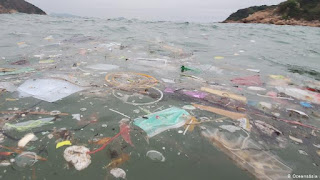Re-calibrate ‘Single Use Plastic Ban’ amidst COVID era
With
the onset of the pandemic and recurrent lockdowns globally the year 2020 has
left its own mark. Though the earth had
an opportunity to heal itself nevertheless it has presented a huge challenge
before us i.e. re-emergence of plastic pollution debate.
Every day
approximately 8 million pieces of plastic pollution find their way
into our oceans. There may now be around 5.25 trillion macro
and microplastic pieces floating in the open ocean. UNICEF estimates that
by the end of the year, we need 2.2 billion surgical masks, 1.1 billion gloves,
13 million goggles, and 8.8 million face shields along with Personal Protective
Equipments (PPEs). It’s not been long since we celebrated June 8th as World
Oceans Day giving us a reminder about the importance of oceans' role in our
everyday life. With the waste generated and disposed harming the biodiversity
and marine ecosystem, the health of the oceans is fraught in distress, wreaking
havoc on the delicate marine ecology. Pandemic has cast its spell on economy,
lives and livelihoods of people and measures are taken towards its revival. ‘But,
are we combating the menace of single use plastic pollution?
The
masks made of polymers take over 350 years to decompose and such waste can get
washed down, especially during monsoon and break down into tiny pieces called
micro-plastics. Upsurge of plastics has raised opportunities for plastic
companies but has subsided our efforts towards our national priorities like
Single-Use Plastic Ban and Swachh Bharat Abhiyan. Our efforts to meet the 2022
deadline of phasing out Single-use plastics should not go in vain. Shouldn’t we
do something to minimize waste and reduce its effect on public health and marine
ecosystems as well?
United
Nations has already called on countries to treat waste management as “urgent
and essential” to combat Covid-19 and prevent knock-on effects on public health
and the environment. Doctors in Nebraska are sanitizing surgical masks
with ultraviolet light for reuse while Ford is making medical gowns from
airbags to be reused upto 50 times. This is indeed a good beginning. It’s
time we encourage a circular-wise approach with focus on recycle, re-use,
regenerate, and reduce etc. to minimize the increasing trash. Reusable eco-friendly
cloth masks by common public can also be seen as viable. Anticipating an
increased use of plastics, can policymakers and countries foster a coordinated
governance strategy towards a more holistic view of the cause-effect pathways,
evaluate socio-economic environmental consequences, strengthen awareness and
share knowledge to rethink a responsible production-consumption model of
plastic management?




Comments
Post a Comment